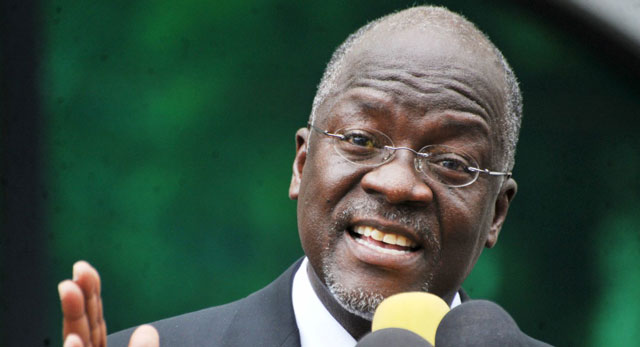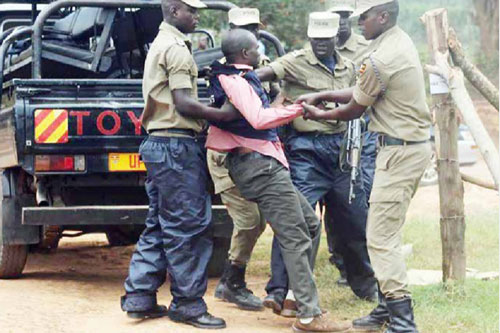
In Uganda, Police top list of perpetrators of attacks on journalists for fourth year
Dar es Salaam, Tanzania | AFP | Press freedom in Tanzania is being squeezed under President John Magufuli, leaving journalists fearful.
France-based watchdog Reporters Without Borders (known by its French acronym, RSF) ranked Tanzania 83rd out of 180 countries in its latest annual press freedom report.
The East African country was down a dozen places from the previous year, representing the second-largest decline in the world, after Nicaragua. Tanzania is however still better placed than Kenya at 95 and Uganda at 112.
Uganda drops 10 places in World Press Freedom Index https://t.co/NpLvPdTsvH pic.twitter.com/t4pBzcCOB4
— The Independent (@UGIndependent) April 28, 2017
Magufuli, nicknamed “tingatinga” — meaning “bulldozer” in Swahili — was elected in October 2015. His talent for publicity-grabbing stunts that bolster his reputation as a no-nonsense, corruption-busting man of the people, have made him wildly popular among some.
But his intolerance of criticism, impulsiveness and disregard for due process worry others who see a wide authoritarian streak at the core of his populism.
Magufuli “tolerates no criticism of himself or his programme,” RSF said in a commentary published with the report last month.
Tanzanian journalists have watched with concern as their situation has worsened under Magufuli.
“Press freedom is being seriously limited,” said Jenerali Ulimwengu, a veteran journalist, legal expert and former diplomat. “We are facing many challenges.”
Ulimwengu said Tanzania’s Media Services Act of 2016 in particular “restricts people from practising independent journalism” by granting the government “extensive powers to control the freedom of the press.”
“We complained under previous regimes, but today we are really starting to suffocate,” said a reporter at the Swahili language daily Mwananchi, on condition of anonymity.
– ‘What can my pen change’? –
“We cannot even denounce abuses by a member of the president’s entourage, because then the president feels personally targeted,” the journalist added, citing the case of Maxence Melo, founder of the whistle-blowing Tanzanian website JamiiForums.
Melo was arrested late last year and faces prosecution for not disclosing his sources for stories that revealed alleged corruption in private companies with links to government.
RSF said last year that since Magufuli’s inauguration, several radio stations have been suspended and at least a dozen people are being prosecuted for critical comments made on social media.
In August 2016, advocacy organisation the Committee to Protect Journalists (CPJ) said Magufuli’s government “has taken a series of steps to restrict Tanzania’s media environment.”
Journalists in Tanzania have responded to the deteriorating situation with weary resignation and self-censorship.
“What can my pen change in a country where even MPs are arrested for criticising the infallible president?” asked a journalist working for the private daily The Guardian, who also did not want to be named.
“Self-censorship is becoming widespread,” the reporter added.
In March, a group of Tanzanian organisations led by the Legal and Human Rights Centre (LHRC) began a year-long campaign of seminars and discussions to push for respect for freedom of expression and the review of new laws, including the Media Services Act, which they say is too restrictive and needs to be reformed.
Magufuli, however, shows no sign of backing down. In January, he criticised two unnamed Tanzanian publications, accusing them of “jeopardising national peace” and “incitement”.
He compared the newspapers to media houses in neighbouring Rwanda that called for the wiping out of ethnic Tutsis ahead of the 1994 genocide.
“This will not happen under my watch,” he said, in words reminiscent of Rwanda’s own strongman leader, President Paul Kagame, who is known for restricting basic freedoms while pushing for economic growth.
****

Police top list of attacks on journalists in Uganda
May 2, 2017 , KAMPALA| ACME| The Uganda Police Force was the major perpetrator of violent crimes against journalists last year according to the Uganda Press Freedom Index released today by the Human Rights Network for Journalists (HRNJ-Uganda). This is the fourth year in a row that the police have topped the list of violators of press freedom.
In the report titled, ‘Tough times: Political intolerance stifles media’, HRNJ-Uganda documents 135 cases of violations against journalists in 2016, a slight decline from 143 cases reported in 2015. Of the 135 cases, police committed 83 violations against the media. Other offenders were politicians, security agents and members of the public. (CLICK TO READ FULL ACME STORY)
Press Freedom Index 2016 Uganda by The Independent Magazine on Scribd
 The Independent Uganda: You get the Truth we Pay the Price
The Independent Uganda: You get the Truth we Pay the Price



